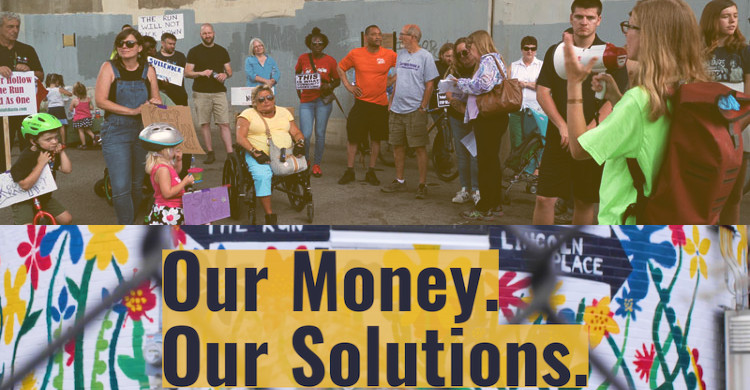
Residents and Community Groups Affected by Proposed Mon-Oakland Roadway release Letter Calling on City Council, Foundations, Academic Institutions, and Public Agencies to Fund Alternative Transportation Proposal Entitled “Our Money, Our Solutions.”
December 6, 2019 – Pittsburgh, PA – As the City of Pittsburgh continues to advance the “Mon-Oakland Mobility Corridor,” a controversial roadway project that would cut through Schenley Park, 23 community stakeholders in affected neighborhoods—as well as more than 600 City residents—have issued a letter calling on City Council to reallocate the $18–23 million of roadway funding toward accessible sidewalks, bike trail connections, expanded transit service and safe pedestrian crossings on busy streets.
Hazelwood resident and father of four Eric Williams says, “I’m a commuting cyclist, and I do a lot of walking through these neighborhoods—both by myself and with my children. There are numerous broken, missing, unsafe, and illegally parked-on sidewalks, as well as unsafe crosswalks in Hazelwood where my children and I have nearly been run over several times. I know my neighbors have unmet public transportation needs, too, such as weekend bus service gaps. Has the City asked residents if this project is really the best solution to meet their needs? Did they check its alignment with the Greater Hazelwood Neighborhood Plan? I’m not convinced they have.”
Requests for these critical mobility and safety investments have been documented in countless studies over the years, including in the recently approved Greater Hazelwood Neighborhood Plan and in the recent SPC 885/2nd Ave Corridor Study. Time and time again, the public has been told that there is no money to make these investments a reality. Yet now a project costing more than $16 million dollars is being put forward instead of community solutions. The Mon-Oakland roadway would instead host unspecified privately-run transportation modes—leaving a plethora of open questions such as usage costs, disability access, hours of operation, passenger-carrying capacity, safety for other park users, and impact on adjacent neighborhoods and the natural environment. Because of these concerns—and the Mon-Oakland Corridor’s dubious utility in addressing the communities’ very real transportation and pedestrian safety needs—the proposal has been met by considerable opposition. Funding these priorities instead would be in line with Pittsburgh’s 2016 adoption of the Complete Streets ordinance.
Four Mile Run resident Barb Warwick says, “We need flood mitigation, not a roadway that would degrade Schenley Park, and one that would drive through the heart of our community. Public money should be used for public good, and we are proud to collaborate with our neighboring communities to enhance the transit, bike and pedestrian connections between us—in an equitable and effective way.”
Dozens of Four Mile Run, Hazelwood, Greenfield, Panther Hollow, and Oakland residents will testify along with other stakeholders on Monday, December 9 at 10 a.m. at the Tax, Budget and Citizen Participation Hearing at City Council to raise concerns about the proposed roadway and its transportation utility, environmental consequences, safety impacts for cyclists and pedestrians, traffic and affordable housing implications, and whether it’s a responsible use of public funds. They will call for the “Our Money, Our Solutions” plan to be funded instead.